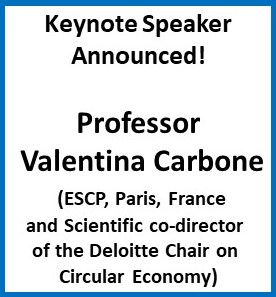JFBS 10th Annual Conference 2020
"Circular Economy Transition: Exploring the Institutional, Organizational & Behavioral Dimensions "

■Date: September 4-5, 2020→Postponed to September 2021
■Venue: 5F, No. 11 Building, Waseda Campus, Waseda University, Tokyo, Japan
■Theme: Circular Economy Transition: Exploring the Institutional, Organizational & Behavioral Dimensions
Produce, consume, dispose – this is the traditional industrial model our economy is based on, and it is well known that most businesses operate in this manner. It is also well known that this linear model is not sustainable for much longer. Against this background, organizations such as the Ellen MacArthur Foundation have proposed the Circular Economy (CE) as a viable and restorative model in which economic growth is decoupled from natural resource and energy consumption. In CE, end-of-life waste becomes “food” for other value chains, and more broadly, the focus is on maximizing what is already in use along all the stages of a product’s lifecycle, from sourcing to supply chain, to consumption, to the remaining unusable product or component.
The literature on business models for CE has emphasized recycling strategies for the end of life of products (closing the loop), or eco-development approaches to extend the usage of products (slowing the loop). It has also been argued that slowing the loop can be achieved through different modalities, such as longer consumption cycles due to higher durability, or sharing economy initiatives based on access instead of ownership and on recirculation of goods though digital platforms.
Across the world, against the backdrop of the current climate emergency and resource scarcity, policies are encouraging transitions towards CE, and many countries have been promulgating laws and other regulatory measures to trigger circular entrepreneurial initiatives and to favor linear business model adaptations, mainly for critical and strategic materials.
We also argue the theoretical underpinnings of CE. How does CE revamp neighbor concepts and paradigms like Sustainability, Industrial Ecology, Permaculture, and Sharing Economy?
By looking across disciplines and being attuned to both historical and contemporary debates and practices, the JFBS Annual Conference 2020 will critically explore issues around the Circular Economy, covering (but not limited to) the following topics:
1. Polices and strategies for CE. How do the regulatory and institutional contexts enable a CE transition? What kind of public policies are likely to frame the development of CE at the local, national and international levels? How do businesses embed CE concept into strategy?
2. Circular entrepreneurship. What are the entrepreneurial profiles of the CE field? How do they deal with the CE issues in local, national and international contexts?
3. New consumption patterns and the circular economy. What are the new consumption patterns and motivations triggering or challenging CE development?
4. Sub-themes. Sustainable Fashion, Lost Food, New Plastic Economy, Car/Bicycle/Space Sharing, Regenerative Agriculture, Renewable Energy…
General topics on Business and Society are also welcome!
Call for Papers (Research/Case Study)
Please submit a A4 one page proposal for a single paper and add three keywords (either in English or Japanese) to info@j-fbs.jp.Schedule |
|||
| Deadline for Submission |
May 31, 2020 →Postponed to May 31, 2021 |
・An A4-size sheet (approximately 800 words) proposal with the theme and 3 keywords ・Please send the proposal to info@j-fbs.jp |
|
| Result Notification |
June 30, 2020 →Postponed to June 30, 2021 |
||
Program Committee
・Carbone, Valentina (Professor, ESCP, Paris, France)・John, Michele (Professor, Curtin University, Australia)
・Tanimoto, Kanji (Professor, Waseda University, Japan)
Doctoral Workshop
■Date: September 4, 2020→Postponed to September 2021
■Venue: 5F, No. 11 Building, Waseda Campus, Waseda University, Tokyo, Japan
■Theme: Any themes related to Business and Society are welcome
■ For details.
Accommodation
Tokyo is a very large and attractive city and benefits from plentiful accommodation. See the following website for more information.- Japan National Tourism Organization
- Japan Guide

